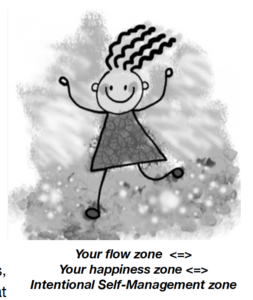 ‘Think in simples’ as my old master used to say – meaning to reduce the whole to its parts in simplest terms, getting back to first principles.
‘Think in simples’ as my old master used to say – meaning to reduce the whole to its parts in simplest terms, getting back to first principles.
Frank Lloyd Wright – Architect
When you’re working, ‘are you in the flow’? This is the same idea of ‘being in the zone’ in sports or exercising Intentional Self-Management. The answer to this seeming simple question can make the difference between fun and dreading your work in VUCA time. Read on…
Story: Hungarian psychologist Mihaly Csikszentmihalyi’s wrote Flow in 1969. He called flow: “the state in which people are so involved in an activity that nothing else seems to matter.”(‘The Music of Flow’, New York Times, April 19th, 2013)
Csikszentmihalyi looked at how a person drifted in and out of flow. The preferred work condition was to be in flow. The opposite of flow resulted in boredom, worry, fear, and anxiety, which are words used to describe the current state of COVID work. In the work flow zone, you lose a sense of consciousness including internal negative messaging. A person in flow is in control and actively managing what he or she is doing. Time seems to stand still. You gain a sense of managing your time, life, work, and activities.
 Happiness results when you’re totally absorbed in what you’re doing. You don’t achieve happiness directly by pursuing it. Happiness results when you forget time and are one with what you’re doing.
Happiness results when you’re totally absorbed in what you’re doing. You don’t achieve happiness directly by pursuing it. Happiness results when you forget time and are one with what you’re doing.
In athletics, this is called the peak experience. In sports, when a player does a great shot, folks wonder: ‘What happened? How did you do that’? The player says: ‘I was in the zone’. The athlete feels extraordinarily powerful, relaxed, and potent. If athletes can do it, why can’t you do it as well? More time you spend in your flow, the happier you’ll be.
Work Lesson Earned: VUCA time is tough for everyone. Are you in the zone when you work or in your job? If not, why? How many of these flow experiences do you have:
• Clear tasks and doable projects?
• Regular feedback on how you’re doing?
• Total involvement or being ‘one’ with your activity?
• Daily anxieties and frustrations disappear?
• Total concentration on what you love to do?